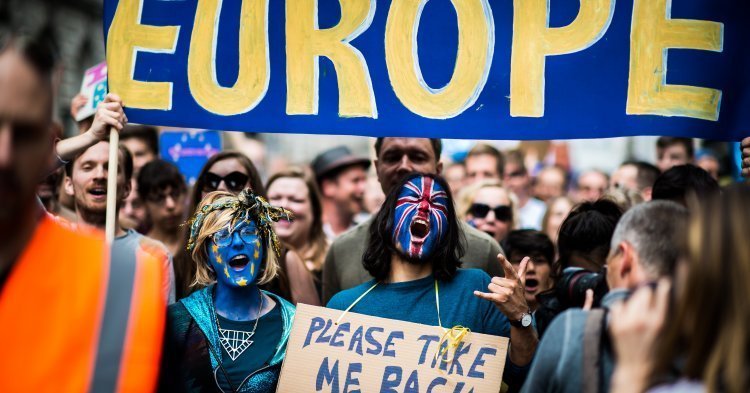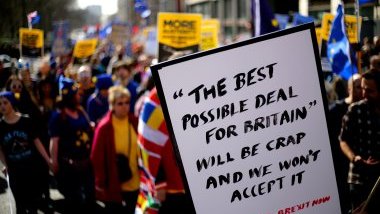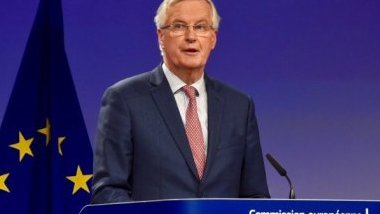Historical reminder
On 23 January 2013, David Cameron, at the time UK’s Conservative Prime Minister announced that if he were to be re-elected for the 2015 legislative elections, he would hold a referendum about the United Kingdom European Union membership (also called EU referendum or Brexit referendum). His goal was not to leave the EU but to pressure Brussels into negotiating a new, more advantageous status for London. Obviously, Brussels did not follow up on this blackmail, given that the United Kingdom had already been granted many benefits and derogations in its 43 years of EU membership.
Re-elected on 7 May 2015, David Cameron kept his promise and organised a referendum. In February 2016 however, he reached a compromise with his European partners, and used this compromise to support his ’Remain’ campaign so as to stay in the EU. It was therefore a dire surprise when on 23rd June 2016, day of the historical vote, the ’Leave’ won by 51.9% with an impressive participation rate of 72.1%. On 29 March 2017, after a lengthy debate in Parliament, the United Kingdom officially requested to leave the EU by invoking article 50 of the Treaty on the Functioning of the European Union (TFEU). Since then, the European Commission and the European Council have organised the conditions of the divorce with the United Kingdom in an often-tensed atmosphere. The main actors of this negotiation are Michel Barnier, ’European Chief Negotiator for the United Kingdom Exiting the European Union’, and David Davis, ’British Secretary of State for Exiting the European Union’. Before getting started with the negotiations of future relationships between the UK and the EU, in particular in terms of trade, the European Union wanted to work out an agreement on the terms of the divorce (cost, European citizenship and situation of the two Irelands).
On 8 December 2017, an agreement was painstakingly reached on the terms of the divorce. This compromise is demanding, despite David Davis’ statements on the matter. This agreement, which completes a cycle of complicated negotiations started on the 19th June 2017, deals with 3 important subject matters:
The divorce bill: British people have finally accepted to pay the amount of 50 billion euros to the EU as a compensation for the contributions planned by the common budget until 2020, as well as to fulfil other commitments such as European officials’ pension rights.
Theresa May’s government has committed to preserving the entirety of rights for European citizens residing on the United Kingdom (there are 3.2 million of them) until 29 March 2019, which is the set date for the leave to take effect. However, no guarantees have been given past this date, [1] especially as the Court of Justice of the European Union would no longer have any authority to protect these rights after the Brexit. A visa regime would penalise students, less qualified workers and family reunification.
The United Kingdom would not establish a physical border between Northern Ireland and the Republic of Ireland, in accordance with the Good Friday agreement of 10 April 1998, although the United Kingdom should leave the European internal market. The EU27 has remained firm and united on these agreements, and the UK had no choice but to give in. It would have been outrageous for European citizens wishing to stay in the UK to be threatened because of an absurd decision, or for the Republic of Ireland, which is a member of the EU and the euro area and intends to keep it that way, to become isolated and locked in because of a border in Ireland!
From then on, we could enter into a second, even more complicated, negotiation phase on the matter of future relationships between the UK and the EU, in particular regarding trade. Indeed, on 14 and 15 December 2017, the European Council (the 27) accepted to open the second phase of negotiations. The European Council also accepted for the United Kingdom to benefit from a two-year transition period, brought to 21 months in January 2018, therefore bringing the deadline to the 31 December 2020. During this period, European law would still apply (i.e. the EU pillar that are the four fundamental freedoms: the free circulation of persons, goods, services and capitals) although British people would no longer be able to partake in decision-making within the EU. The first discussions on this transition period started in February 2018 while the discussions on a future trade agreement should officially start in March 2018, day of the UK’s withdrawal from the EU. Given that the free-trade agreement with Canada took 8 years of laborious negotiations, the two-year timeframe for the transition seems a little short…
It’s only just the beginning!
The whole affair is confusing. At the end of January, the EU bodies seemed to leave the door open for the UK to… stay in the EU and Nigel Farage called for a new referendum so as to “clarify” positions. However, Theresa May reminded that “there will be no second referendum on Brexit”. British politics are in deep chaos, much worse than during the 1956 Suez Crisis! No one dare to bid on how long Theresa May’s government will last. All British political sides (even the Conservatives) are divided on Brexit, to the point of sometimes looking for a plan B. There still are protests criticising it and brandishing the European flag. A serious survey just revealed that according to “hard Brexit” hypothesis, the UK would lose between 5 and 8% on GDP growth in the next 10 years. The economic world is more and more dismayed by the consequences of Brexit. On the political side, a new movement called ReNew was born, militating to give up on Brexit.
Which consequences?
Even if Brexit has not happened yet, we can already witness its economic and social consequences. Inflation has significantly increased. Consumption is clearly dropping. Internal and external investments stagnate. Foreign direct investments diminish. All this will continue to chip away at growth and living standards, more so with the drop of the pound and the important private and public debt. Exports are not progressing. On the other hand, the unemployment rate is as low as ever with 4.5%. Already in 2017, the European Investment Bank (EIB) had lent less money to the UK. Furthermore, the EIB should review its capital since the UK owns 16% of it. The EIB will stop lending to the UK as soon as the leave will be effective. This will be yet another inconvenience for the British economy since it does not have a national development bank, at the moment.
The transfer of the Galileo Security Monitoring Centre leaves the United Kingdom and is following the transfer of the European Medicines Agency, moving from London to Amsterdam, and the European Banking Authority which is moving to Paris. For the EU, despite some economic turmoils since 2008 (which are now over, with growth happening everywhere, even in France), the EU have stood their ground when facing the UK since the very beginning of negotiations. The EU also remained united, despite the Visegrad group (Poland, Hungary, Czech Republic and Slovakia) becoming more and more divergent. The European Union is harsh with the United Kingdom and firmly stands its ground. The City of London will lose the advantages of the “financial passport” while the financial sector accounts for 7.5% of the British GDP. Many jobs will be lost. The currency will also suffer. Over 20% of the transactions made in the London’s Central Business District are in euro!
Concerning politics and geopolitics, the United Kingdom is also rather isolated. The USA do not offer a good alternative for the UK. One year ago, Theresa May was the first to meet Donald Trump shortly after he was elected. One year later, a breaking point was reached with the capricious and nationalist president. The relationship was anyway already strained on both sides of the Atlantic since the Iraq war.
We must hope for the final global agreement to be as thorough as possible, as well as not a source of conflict. Brexit should also be as soft as possible for if things go wrong in the UK, it will affect the EU as well – although to a lesser degree. That is how interdependent our economies and finances are in a world of growing globalisation. Whether we like it or not, our interests are alike. There may not be eternal friendships, but there are joined interests. If the negotiations do not result in a clear outcome, the UK’s departure would then take effect after two years and with hard conditions. The United Kingdom would then have a third country status in its trade relationships with the EU, thus excluding it completely from the Single Market. Maybe the EU would also have to kiss their 50 billion euros goodbye since the payment of the total amount in so little time is not possible and the climate could become tense in a context of internal politic crisis… From a legal point of view, the withdrawal agreement is separate from the agreement on the future relationship and the financial settlement will be part of the withdrawal agreement. The bill will therefore have to be paid, although from a political point of view, this financial settlement remains uncertain (diplomatic tensions, breaks in negotiations, alas, anything can happen…)
Nevertheless, the EU would still have the upper hand given that the UK has hindered many decisions in its 43 years of EU membership; such as the creation of new EU specific resources for the European budget or any advanced attempt at political integration. Anything is possible now, no more veto from the UK! Europe will evolve even faster.
“In a Democracy, the people are always right… even when they’re wrong.”
The British people voted. In a democracy, the people are always right… even when they’re wrong! To their credit, it seems that a great number of people were cheated, fooled by sweet-talking, demagogic nationalists and Europhobics – such as Nigel Farage and Boris Johnson, to only name a few – who promised unrealistic and misleading advantages if the UK were to leave the EU! In so doing, they denied all the catastrophic consequences that we are only beginning to oversee. The silver-tongued politician even had the nerve, or was it arrogance, to admit that they had lied.
Today, there is no choice but to conclude that British people, including the political class, is torn. Are we headed towards a hard or soft Brexit? No one can tell. It is all a blur. Michel Barnier, negotiator in chief for the EU, was in London on the 5th of February and requested that his counterparts “clarify their position” before the summit of the Heads of State and Government. It took place at the end of March, adopted the guidelines of the transition, and launched the trade negotiations. “It is now time to make a choice”, concluded Michel Barnier. In distress, Britain tried to abide by the popular saying “You cannot want to have your cake and eat it too.”
The deed is done, and our British friend will unfortunately have to pay for the price of Brexit in the years to come. Of course, every cloud has a silver lining: Brexit, whose outcome we have yet to see, has not appealed to anyone else, not even Poland or Hungary. Several nationalist and extremist parties have been stalling and quieting down for months now, like the National Front in France. In the end, the British vote may well be beneficial for other European nations!







Follow the comments: |
|
